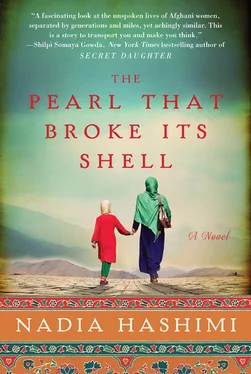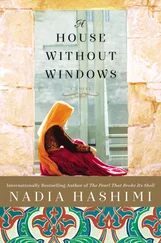“How could this have happened? Was it here? In the palace?”
“No, he was in Jalalabad. It must have happened two days ago at least, if word is getting to us now. I can’t believe someone killed him.”
“What’s going to happen now?” Gulnaz said while Shekiba put a hand on her son’s head. Shah had just entered the room and looked at his father with concern. He had no idea what “dead” meant but he could sense that something was not right.
“I don’t know. My guess is that Amanullah will take his father’s place. And he rightfully should. But it’s impossible to say. If his assassination was a coup, then his assassin will have to get through the army. They’ve sworn allegiance to Amanullah.”
“Allah, have mercy on us. This could be a disaster for Kabul!”
“We’ll sit tight and see. Just keep the children inside and keep your mouths shut. This is no time to speculate with the neighbors. Be smart.”
Shekiba turned away so Aasif would not see her roll her eyes. It was hard to swallow such words of wisdom from a man who had violated the king’s harem and condemned Benafsha to a horrible death. Where was his sense of caution then?
But they did as he said and Aasif nervously returned to his post in the Ministry of Agriculture in the morning. The streets were desolate as panic spread through the capital. Aasif stockpiled extra food as a precaution. The assassin was still unidentified and no one had made any moves toward the palace but the army was on high alert, all the same.
Aasif had not seen Amanullah in nearly a year, but now it was critical he reconnect with his friend. He needed to pay his respects and make sure he was aligned with the man who would most likely be taking Habibullah’s place as ruler of Afghanistan. He stopped by the palace, his nerves on edge.
Amanullah was heartbroken and enraged, Aasif reported to his wives. His father’s brother Nasrullah had accompanied the king on his hunting trip. Word came from Jalalabad that Nasrullah had been proclaimed Habibullah’s successor, which angered Amanullah. Amanullah’s eldest brother, Inayatullah, seemed to be in support of his uncle, as were many of Habibullah’s sons.
Amanullah, born to the king’s chief wife, knew his father would have selected him to take the throne. And as leader of the military and treasury, Amanullah was in position to assume the reins of the country and declared himself the new king from his post in Kabul.
Shekiba could picture him, his heart heavy with grief, his noble face drawn and sad. He would be a just and wise king, she knew. She blushed to think of how stupid she had been five years ago, to think that such a man might want her.
I have no reason to complain, though. I am married to a man with a respectable position in the Ministry of Agriculture. He keeps us fed and clothed in an esteemed neighborhood of Kabul. He provides for his children and does not beat me. What more could I have asked of Allah?
Aasif carefully worked to bring himself closer to Amanullah and the new king welcomed his friend’s counsel in such a difficult time. He wanted to avenge his father’s death and there were a handful of people under the cloud of suspicion, including his own uncle Nasrullah, who, it was rumored, had not shed a single tear at his brother’s death. Amanullah made an announcement. He would find the assassins and bring change to Afghanistan. Reform was on the way. He banned slavery. He vowed to increase pay for the army. Afghanistan would maintain its friendly relationship with India.
He is not like his father. He is a better man, Shekiba thought as she heard the declarations. God be with you, King Amanullah.
By April, an investigative committee had looked into Habibullah’s murder. Amanullah jailed his uncle Nasrullah and a dozen others in the palace dungeons. Aasif stood by his friend as the palace prepared to spill blood.
Amanullah brought with him many new ministers and Kabul braced itself for the changes that would come with their new leader. Shekiba and Gulnaz felt more secure when it became apparent that there would be no bloody challenge to Amanullah’s claim to the throne. Kabul transitioned relatively peacefully, eager to see their bold young king fulfill his promises. Shekiba smiled, ruffling her son’s hair, feeling that Amanullah would make Afghanistan better for her Shah.
Their link to the palace revived, the Baraan family became host to some of Amanullah’s other advisers. Gulnaz served guests tea and nuts that Shekiba prepared from the safety of the kitchen. They eavesdropped on conversations, feeling privileged to have the first scoop on Kabul’s political affairs. Compared to the other wives of the neighborhood, they were much more informed, and Gulnaz, the more social wife, enjoyed flaunting it in conversations with other women. She made sure their audiences knew how well connected their household was. In a city like Kabul, connections counted for everything, so she didn’t mind the extra work that came with Aasif’s many guests.
Gulnaz and Shekiba wished the men would talk more about Amanullah’s wife, Soraya. What they did hear was astonishing. She was educated and beautiful. She was born in Syria and spoke many languages. Amanullah took her everywhere and consulted with her. They wanted to hear more about their mysterious queen but the discussions usually centered on what Amanullah’s next move would be, since he had promised big changes when he assumed the role of king.
“How much of Tarzi’s reforms do you think he’ll take on?”
“He’ll take on them all, if you ask me!” Aasif said. “He thinks the world of his father-in-law, probably even more than he thought of his own father, may Allah grant him peace in heaven.”
Gulnaz shot Shekiba a look of surprise. It seemed Aasif finally knew how to speak respectfully of Habibullah when he needed to.
“You’re as mad as Tarzi himself. This is Afghanistan, not Europe. We are not like those people and shouldn’t try to be. Let us concentrate on our own country and stop ogling others.”
“What’s wrong with learning from others?” someone asked.
“Depends on what you learn from them.”
“What’s happened with his brother Inayatullah?”
“He and a few other brothers have sworn allegiance to Amanullah. He’s going to release them from the dungeon tomorrow. His uncle will remain in prison. There is too much doubt over his head. He’ll stay in chains for the time being.”
“People are angry about that. They do not feel it is just.”
“They will forget when they see what our king is capable of. Soon, they will not remember Nasrullah’s name.”
In May, Amanullah did what Aasif had suggested many years earlier while Shekib, the guard, had eavesdropped in the gardens. Amanullah flexed his muscles and sent soldiers into northern India. Amanullah had had enough of British dominance and acted on his father-in-law’s teachings.
“ Ya marg ya istiqlal! ” Demonstrators in the streets shouted for death or freedom. Gulnaz and Shekiba listened nervously, hoping the crowd would not turn on anyone.
Amanullah had embroiled the country in the third Anglo-Afghan war. Kabul was tense. Everyone talked about the fighting. The army was small but fierce. The Baraan household braced itself. If the Afghans lost, there would surely be another regime change and it was impossible to know what that would bring.
“It’s over,” Aasif announced as he entered the house three months later.
“It’s over?” Shekiba repeated, a habit that drove Aasif mad. She knew it as soon as she said it but it was too late to undo. Shah ran into the living room to greet his father.
“Yes, that’s what I said! Let me see my son! Shah, good news! It’s over. We’ve won our independence from England!”
Читать дальше












